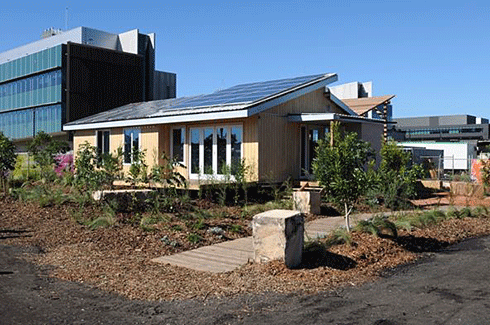
|
Published: 19 August 2013
Smart little Aussie home wins international challenge
A team of Australian university and TAFE students has won the first international Solar Decathlon China for its net-zero energy ‘house of the future’ known as the Illawarra Flame. The project scored 957.6 out of a possible 1000 points for its overall consistency in design, engineering, energy-saving, marketing and market appeal.
Team UOW Australia – a partnership between the University of Wollongong and TAFE Illawarra – is the first Australia team to be invited to compete in a Solar Decathlon event.
The team’s winning entry was also the first house in Solar Decathlon history to demonstrate a retrofit of an existing home.
Modelled on the iconic 1960s Aussie fibro house, the Illawarra Flame, was designed and marketed as a stylish, sustainable and affordable option for Australia’s ‘empty nesters’ – older couples left with a large family home after their adult children have moved out.
The build was carried out in Wollongong, before the house was disassembled and shipped to China for reconstruction at the event site.
The design included incorporation of two prefabricated, high-tech ‘pods’; extensive use of recycled materials; and a heating/cooling air-conditioning system that combines photovoltaic thermal (PVT) air system coupled with thermal storage technology to balance thermal loads between day and night and ensure a high standard of indoor air quality when conditions do not permit effective natural ventilation.
UOW’s Professor Paul Cooper said the university would become home to the Illawarra Flame House after it is shipped back from China.
‘It will be opened regularly to the public, and become a part of the SBRC Living Laboratory program.
‘Importantly, it will provide not only a test bed for new sustainable building technologies, but a vehicle to accelerate the adoption of sustainable retrofit technologies for homes in Australia and overseas,’ he said.
The Datong event was the first-ever Solar Decathlon China event, organised by Peking University, hosted by the US National Energy Administration and Department of Energy, and supported by private companies.
Nineteen other solar-powered houses designed by young sustainability experts from around the world also competed in Solar Decathlon China 2013, the largest event in the competition’s history, with 300 000 visitors attending the public exhibition.
The second place prize went to a team from the South China University of Technology, while third place was awarded to Chalmers University of Technology, Sweden.
Source: UOW




